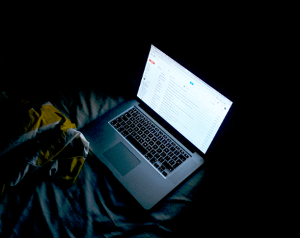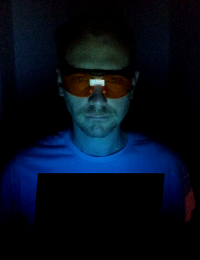Is light at night ruining your health?
This is a quick overview of the problems with light at night and how to keep yourself healthy.
You will be able to answer the following:
1) How is light at night harmful?
2) Why is darkness at night critical for your health and well being?
3) What is it about blue light in particular that is so harmful?
4) What can you do to take control of your light exposure and your health?
Darkness
We all know the importance of getting enough sleep. But do you know about the importance of getting enough darkness? Sadly, most people do not. There is a growing mountain of research showing just how important light is to our biology. The Light / Dark cycle is crucial for the synchronization of many biological processes. You can think of it as two separate states: Daytime Physiology & Nighttime Physiology.
Daytime physiology has distinctive hormonal attributes that are different from nighttime. In the daytime you are primed for physical activities, eating, and are more robust on a cellular level.
At nighttime (or should I say “dark-time”) your body shifts into repair and restoration mode. One of the hallmarks of nighttime physiology is the hormone melatonin. Most people are aware that melatonin helps them to fall asleep. But melatonin is a very complex hormone with a HUGE range of effects. It is powerful antioxidant and is protective against cancer and other health problems. Only in darkness can your pituitary gland produce healthy amounts of melatonin.
Light at Night
 Light At Night (LAN), has become an epidemic in our industrialized world. The research is clear: Circadian disruption is a major contributor to the diseases of modern civilization. Everything from obesity and diabetes, to cancers and heart disease can be traced back to circadian disruption. The research has also identified blue light as the most disruptive type of light. Blue light exposure at night wrecks havoc on the circadian rhythm. Your body is masterfully tuned to calibrate the time of day. It does this through special photo receptors in the eye that track light intensity and color. These receptors are specifically tuned to detect light on the blue end of the spectrum. In nature, blue light is abundant in the daytime and virtually nonexistent at night. Of course in the modern world it’s not so simple…
Light At Night (LAN), has become an epidemic in our industrialized world. The research is clear: Circadian disruption is a major contributor to the diseases of modern civilization. Everything from obesity and diabetes, to cancers and heart disease can be traced back to circadian disruption. The research has also identified blue light as the most disruptive type of light. Blue light exposure at night wrecks havoc on the circadian rhythm. Your body is masterfully tuned to calibrate the time of day. It does this through special photo receptors in the eye that track light intensity and color. These receptors are specifically tuned to detect light on the blue end of the spectrum. In nature, blue light is abundant in the daytime and virtually nonexistent at night. Of course in the modern world it’s not so simple…
Blue Light
The absence of light, especially light in the blue spectrum, is how you body knows that it’s night. Exposures to blue enriched light at erratic time intervals confuses your biology. This inhibits the smooth transition into nighttime physiology.
So where is all this nighttime blue light coming from? Screens and energy efficient lighting!
Unfortunately our most precious tech gadgets stream blue light directly into your eyeballs. If that’s not bad enough, fluorescent and LED lamps also emit way more blue light than incandescent bulbs. Even if the color looks like the same “soft white” as your old bulbs, it is not. White LED lamps have a sharp peak right in the most stimulating wavelength range. Any light at night can negativity impact your biorhythm and melatonin production. Yet, there is a relatively small part of the spectrum that is more disruptive than the rest.

What to do?
The magnitude of contrast between night and day drives circadian biology. Bright sunny days and dark nights on a stable schedule is the ideal. Your biological clock is quite robust and flexible. It can adapt to seasonal variations and varying levels of light due to weather, terrain, etc… What it is not designed for is modern light exposure patterns. Your biology doesn’t cater to your workweek and weekend schedule differences. Unfortunately it doesn’t do well with bright light, food, and drink at 1am one day and then sleeping by 10pm the next. Stability is the key to a healthy circadian rhythm. Of course this is not so practical in modern times. That why this site exists! Here’s a brief summery of what you can do:
Daytime
- Get as much natural light as possible
- Crank up the brightness and color temperature as much as you can indoors
- Spend time outdoors, nothing beats the natural full spectrum light of our sun

Sleeping environment
- Get yourself some quality blackout curtains
- Tape over all the annoying LED lights in your room
- Keep your bedroom cool
Nighttime
- Use low wattage incandescent lights or orange (or red) LEDs
- If you need nightlights get red ones
- Use task lighting rather than overhead lighting
- Orange glasses at least while using electronics (even if using f.lux!)
Quick Start
The first thing that I recommend is to get your self a pair of good quality orange glasses and challenge yourself to wear them at the same time every night for 5 consecutive days. You will be happy you did!
See the articles and guides on this site for more a lot more information and tips. Back to Top ↑

